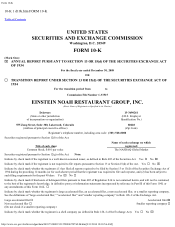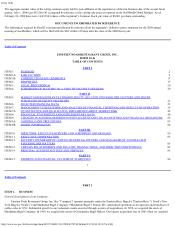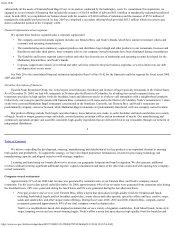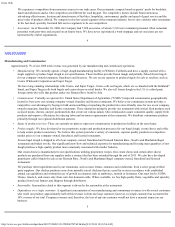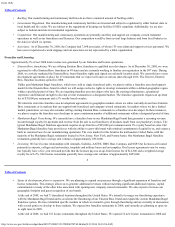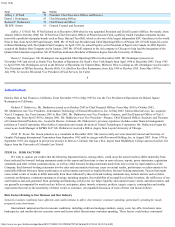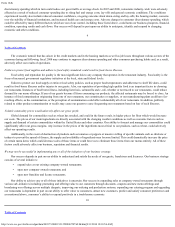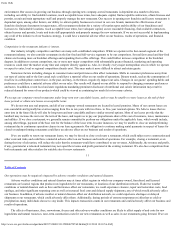Einstein Bros 2008 Annual Report Download - page 11
Download and view the complete annual report
Please find page 11 of the 2008 Einstein Bros annual report below. You can navigate through the pages in the report by either clicking on the pages listed below, or by using the keyword search tool below to find specific information within the annual report.
Form 10-K
http://www.sec.gov/Archives/edgar/data/949373/000119312509042707/d10k.htm[9/11/2014 10:10:56 AM]
not able to anticipate or react to changing costs of food and other raw materials by adjusting our purchasing practices or menu prices, our operating
margins would likely deteriorate.
We have single suppliers for most of our key products, and the failure of any of these suppliers to perform could harm our business.
We currently purchase our raw materials from various suppliers; however, we have only one supplier for most of our key products. We
purchase all of our cream cheese from a single source. Also, we purchase a majority of our frozen bagel dough from a single supplier, who utilizes
our proprietary processes and on whom we are dependent in the short-term. All of our remaining frozen bagel dough is produced at our dough
manufacturing facility in Whittier, California. Although to date we have not experienced significant difficulties with our suppliers, our reliance on
a single supplier for most of our key ingredients subjects us to a number of risks, including possible delays or interruption in supplies, diminished
control over quality and a potential lack of adequate raw material capacity. Any disruption in the supply or degradation in the quality of the
materials provided by our suppliers could have a material adverse effect on our business, operating results and financial condition. In addition, any
such disruptions in supply or degradations in quality could have a long-term detrimental impact on our efforts to maintain a strong brand identity
and a loyal consumer base.
Disruptions or supply issues could adversely affect our business and reputation.
We depend on our network of independent regional distributors to distribute frozen bagel dough and other products and materials to our
company-owned, franchised and licensed restaurants. Any failure by one or more of our distributors to perform as anticipated, or any disruption in
any of our distribution relationships for any reason, would subject us to a number of risks, including inadequate products delivered to our
restaurants, diminished control over quality of products delivered, and increased operating costs to prevent delays in deliveries. Any of these events
could harm our relationships with our franchisees or licensees, or diminish the reputation of our menu offerings or our brands in the marketplace. In
addition, a negative change in the volume of products ordered from our distributors by our company-owned, franchised and/or licensed restaurants
could increase our distribution costs. These risks could have a material adverse effect on our business, financial condition and results of operations.
Additionally, increased costs and distribution issues related to fuel and utilities could also materially impact our business and results of
operations.
12
Table of Contents
Increasing labor costs could adversely affect our results of operations and cash flows.
We are dependent upon an available labor pool of associates, many of whom are hourly employees whose wages may be affected by
increases in the federal, state or municipal “living wage” rates. Numerous increases have been made on federal, state and local levels to increase
minimum wage levels. Increases in the federal and state minimum hourly wage rates in some of the states in which we operate became effective
throughout 2008 and additional increases will become effective throughout 2009. Increases in the minimum wage may create pressure to increase
the pay scale for our associates, which would increase our labor costs and those of our franchisees and licensees.
A shortage in the labor pool or other general inflationary pressures or changes could also increase labor costs. Changes in the labor laws or
reclassifications of associates from management to hourly employees could affect our labor cost. An increase in labor costs could have a material
adverse effect on our income from operations and decrease our profitability and cash flows if we are unable to recover these increases by raising
the prices we charge our guests.
We may not be able to comply with certain debt covenants or generate sufficient cash flow to make payments on our substantial amount of debt or
redeem our mandatorily redeemable preferred stock when due.
Our current debt agreements contain certain covenants, which, among others, include certain financial covenants such as limitations on
capital expenditures, maintenance of the business, use of proceeds from sales of assets and consolidated leverage and fixed charge coverage ratios
as defined in the agreements. The covenants also preclude the declaration and payment of dividends or other distributions to holders of our
common stock. We are subject to multiple economic, financial, competitive, legal and other risks that are beyond our control and could harm our
future financial results. Any adverse effect on our business or financial results could affect our ability to maintain compliance with our debt
covenants, and any failure by us to comply with these covenants could result in an event of default. If we were to default under our covenants and
such default were not cured or waived, our indebtedness could become immediately due and payable, which could render us insolvent.
We have a considerable amount of debt and are substantially leveraged. In addition, we may, subject to certain restrictions, incur substantial
additional indebtedness in the future. Our high level of debt, among other things, could:
• make it difficult for us to satisfy our obligations under our indebtedness;
• limit our ability to obtain additional financing for working capital, capital expenditures, acquisitions and general corporate purposes;

